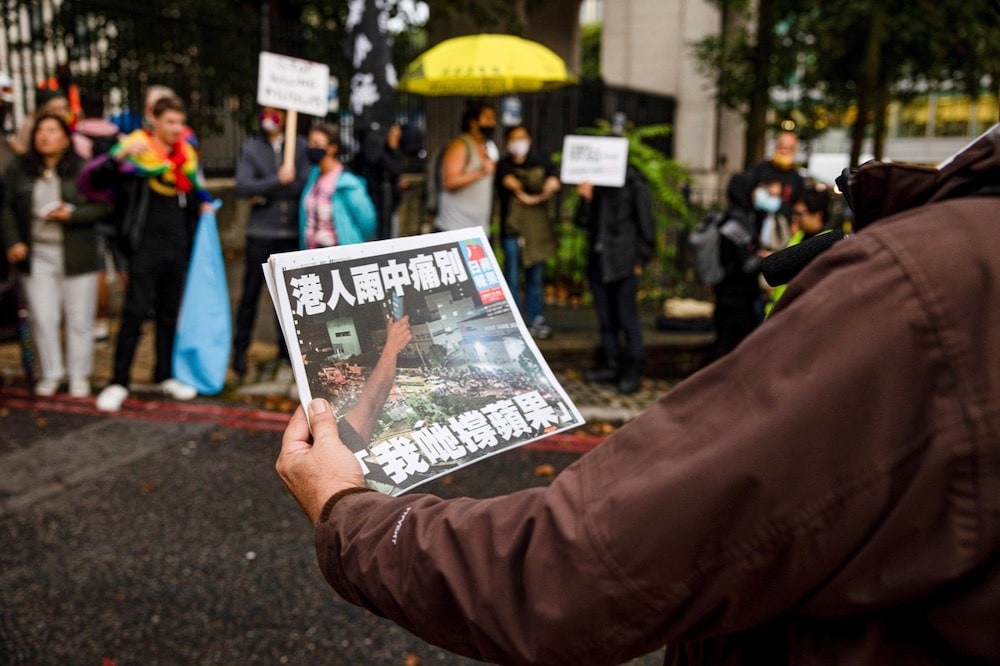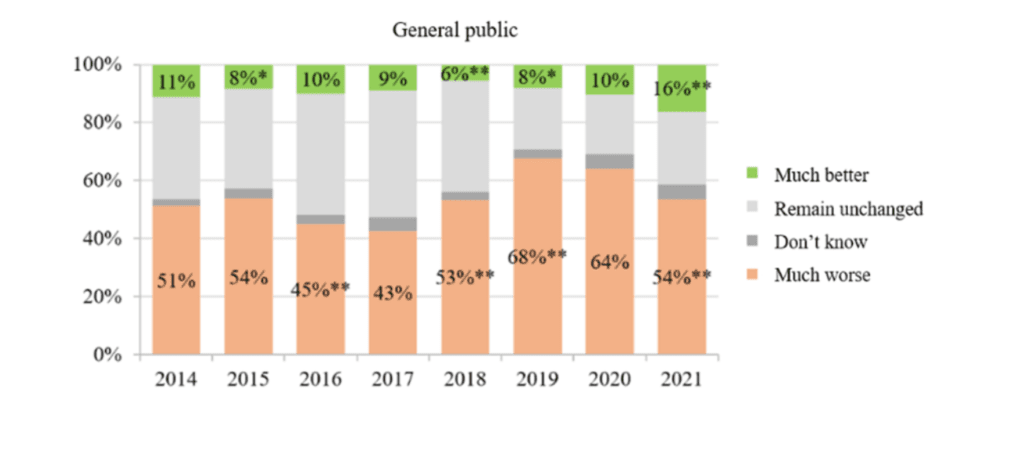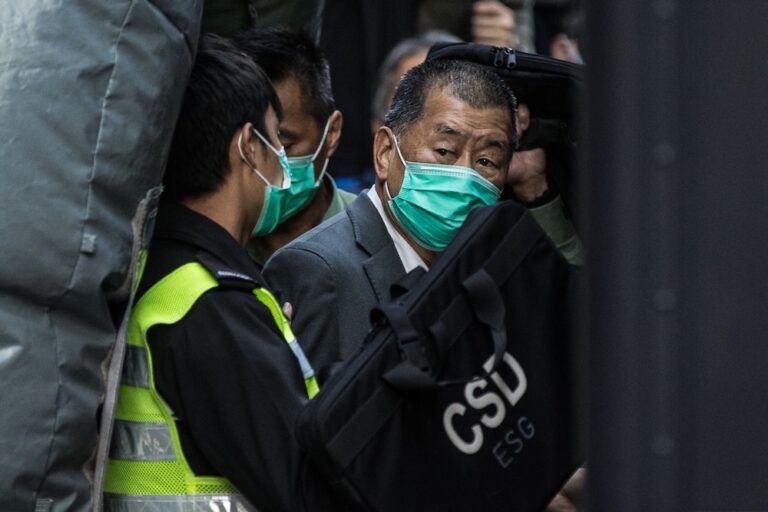The Hong Kong Journalists Association believes that the environment for news reporting in Hong Kong has drastically deteriorated over the past year.
Government targeting the media is the major reason
The general public and journalists both say press freedom has declined in Hong Kong over 2021. Their assessment is measured by the Hong Kong Journalists Association’s (HKJA) latest Press Freedom Index (the Index).
Ratings by journalists dropped almost 6 points, a reflection that the city’s press freedom hit a new low in 2021, following the Index’s steepest decline since it was created in 2013. The industry’s rating on the Index has dropped sharply for three consecutive years, from 40.9 points in 2018 to 26.2 points in 2021.
The respondents said their ratings were based on decreasing diversity in viewpoints carried by local media outlets, and their hesitation when criticising the HKSAR Government or the Central Government. These journalists also said they felt media self-censorship has exacerbated, posing a major threat to press freedom.
The HKJA believes that the environment for news reporting in Hong Kong has drastically deteriorated over the past year. Apple Daily and Stand News closed down shortly after their executives and editors were arrested over allegations that they had endangered national security. Hong Kong Citizen News and several other online media outlets also shut down days later, fearing a similar fate. The wave of media closures triggered widespread panic in the news industry.
As a direct consequence of a shrinking news industry, less information of public interest is now available, and those that remain accessible become more homogenous than diverse.
Hong Kong’s business environment would become less attractive to those seeking opportunities at an international financial hub if there is no longer free flow of information, and if its press freedom is compromised. Ensuring that the press could operate in a free and safe environment will be crucial to maintaining Hong Kong’s status as an international financial centre, while allowing journalists to contribute to the growth of a vibrant society.
It is also worth noting that the HKJA sent out 737 questionnaires to journalists but only received 169 responses, a 22.9% valid response rate, compared to 82.8% last year. Some journalists we approached for the survey said they fear the HKJA has come in the crosshairs of authorities and therefore they fear retribution for filling out a questionnaire conducted by the HKJA.
The Index survey was conducted in May this year and intends to evaluate the state of press freedom in 2021. The survey is composed of two parts, with responses collected from members of the public and from journalists in the news industry. The indexes are scored on a scale of 0 to 100 based on a range of rating indicators, which are scored on a scale of 0 to 10.
Figure 1 Changes in the Hong Kong Press Freedom Index in the past nine years (2013-2021)
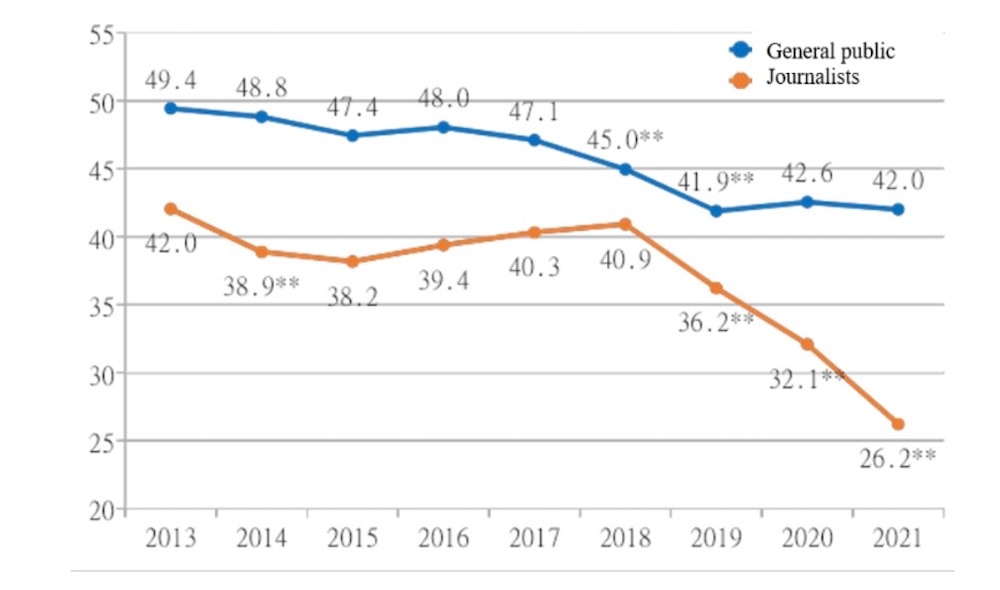
More than half of the respondents from the public group stated that press freedom regressed after 2020. 97% of all journalist respondents said they believed press freedom has declined.
Figure 2 Respondents’ perception of changes in press freedom in the past year@

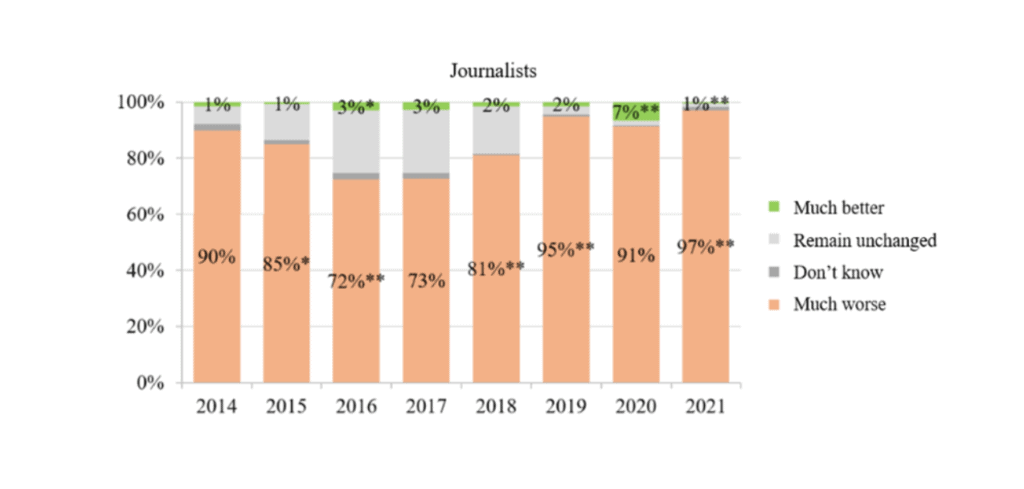 Press Freedom Index for general public
Press Freedom Index for general public
The Press Freedom Index rated based on responses collected from members of the general public was 42, a 0.5 point# decrease from 2020. This part of the Index observed a slight increase going from 2019 to 2020 but dropped again in 2021. The latest decrease is attributed to more obvious declines in two indicators, namely (1) the diversity of viewpoints with local media, and (2) whether media outlets showed hesitations in criticising the Central Government.
Table 1. The indicators with significant changes affecting the general public press freedom index (on a scale of 0-10^)
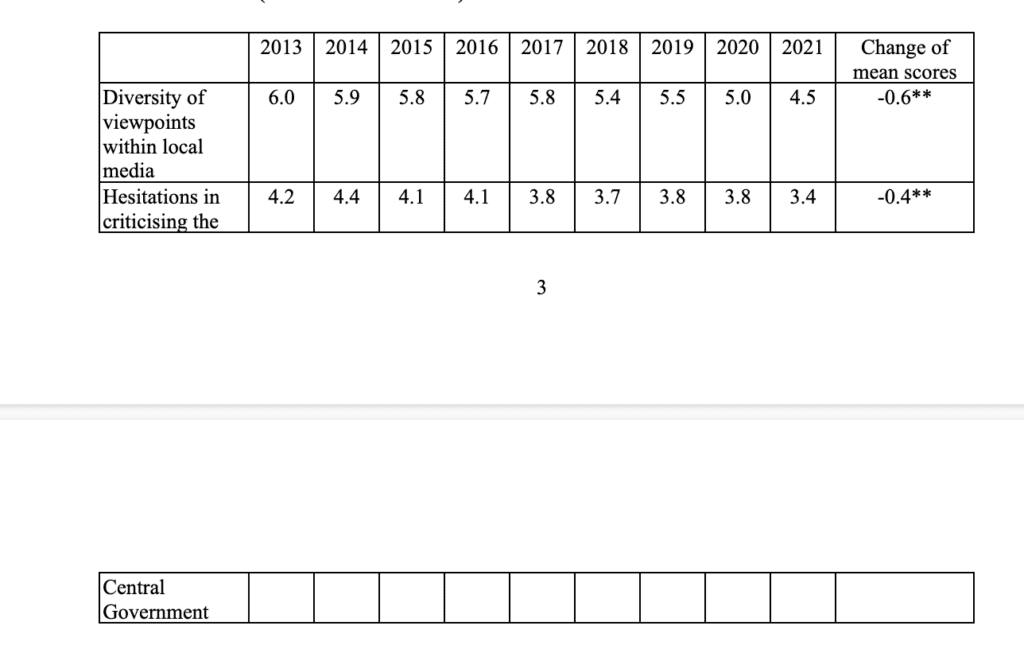
For respondents from the general public, their most important consideration when evaluating Hong Kong’s press freedom was whether local journalists become targets of extrajudicial intimidation or of physical violence when reporting. This factor ranks as the public’s top consideration for two years in a row. Other important considerations by this group are legal protection of journalists and self-censorship by the news outlets.
Press Freedom Index for journalists
The Press Freedom Index rated based on responses collected from journalists is 26.2, a sharp decrease of 5.9 points compared to the Index in 2020. Since the Index was established nine years ago, it has declined year after year, with the sharpest drop seen in 2021. The industry’s rating on the Index has dropped sharply for three consecutive years, from 40.9 in 2018 to 26.2 points in 2021. The Index was dragged down mainly by significant decline in four rating indicators, including those on the media’s (1) effectiveness as a public watchdog, (2) hesitations in criticising the HKSAR Government, (3) diversity of viewpoints within local media, and (4) self-censorship. Although the indicator for self-censorship saw the smallest decrease, it was rated the lowest among all ten indicators, at a meagre 1.8 points out of 10.
Table 2. The factors with significant changes affecting the journalists press freedom index (on a scale of 0-10^)
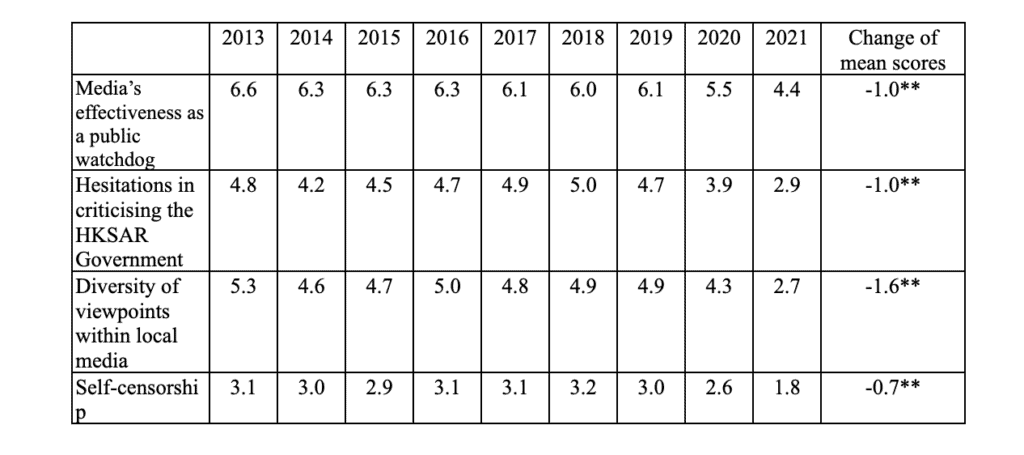
Of the 169 journalist respondents, 97% said they think overall press freedom in Hong Kong has deteriorated compared to 2020, and 98% of all respondents pointed out that the closures of Apple Daily, Stand News, Hong Kong Citizen News and other online media hurt press freedom the most.
Fewer than half of the respondents (43%) said they had been pressured by their superiors to drop or to minimise reporting on issues related to Hong Kong independence, an increase of 2 percentage points#compared to the previous year. 77% of the respondents said they feel uncomfortable reporting on voices that disagreed with the Central Government’s stance on “One Country before Two Systems”, an increase of 8 percentage points.
93% of journalist respondents agreed that the Government is a source of suppression of press freedom, an increase of 8 percentage points from 2020 and the highest since this question has been included in the Index survey since 2014.The general public portion of the Press Freedom Index’s survey was conducted by the Hong Kong Public Opinion Research Institute (PORI) from 12 May to 20 May 2022.
A total of 1,016 Cantonese-speaking Hong Kong residents aged 18 or above were successfully interviewed. Meanwhile, the HKJA distributed questionnaires to journalists between 7 May and 31 May 2022. A total of 169 responses were collected for the industry portion of the Index.The HKJA would like to express its gratitude towards everyone who contributed to the publication of the 2021 Press Freedom Index during this testing time.
Data and visualisation from this press release is available at: https://tiny.cc/HKpressfreedomindex2021
The detailed report for the index is at: https://tinyurl.com/HKPressFreedomIndex2021report
Hong Kong Journalists Association
23 September 2022
| @ | These values have been rounded off. |
| # | This value is derived from exact values, and therefore is different from subtracting the values of 2021 from 2020, which are rounded values. |
| ^ | A larger value represents a more positive evaluation, and vice versa. |
| * | Compared with the last survey, the change is statistically significant at p=0.05 level. |
| ** | Compared with the last survey, the change is statistically significant at p=0.01 level. |
